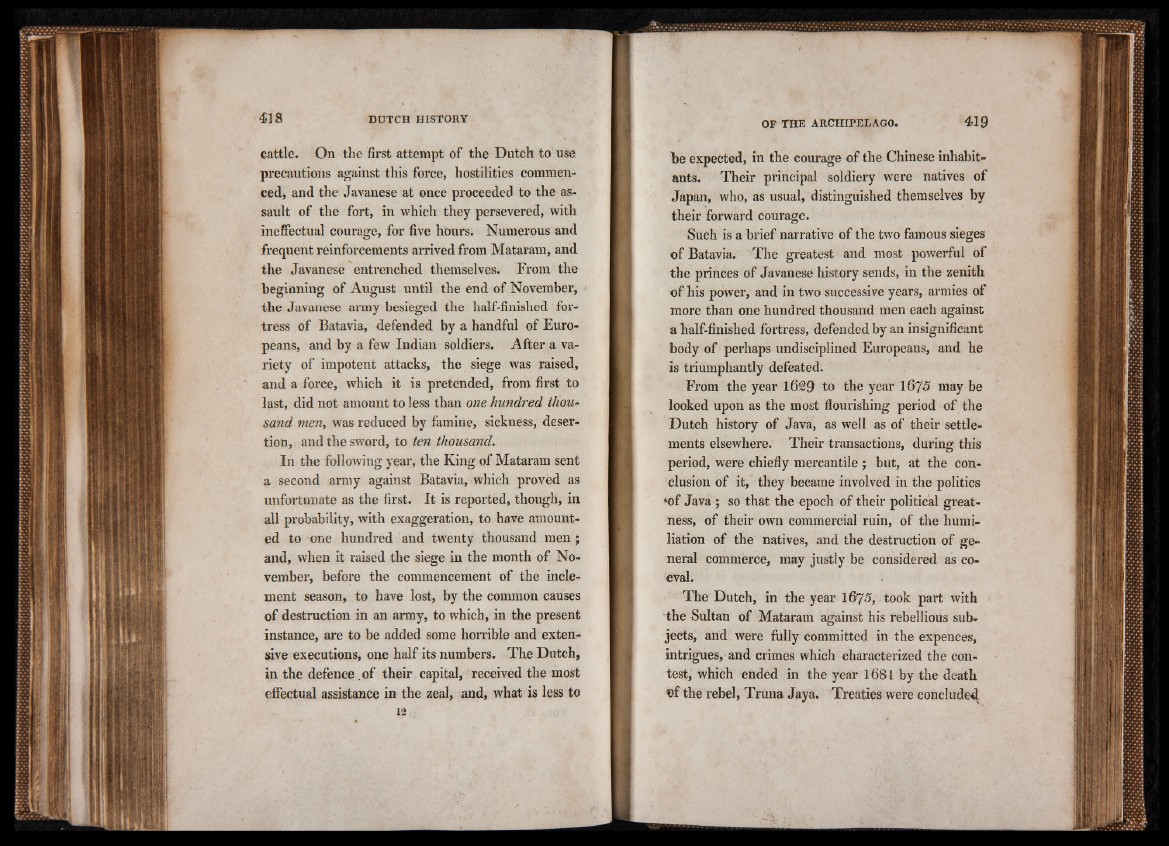
cattle. On the first attempt of the Dutch to use.
precautions against this force, hostilities commenced,
and the Javanese at once proceeded to the assault
of the fort, in which they persevered, with
ineffectual courage, for five hours. Numerous and
frequent reinforcements arrived from Mataram, and
the Javanese entrenched themselves. From the
beginning of August until the end of November,
the Javanese army besieged the half-finished fortress
of Batavia, defended by a handful of Europeans,
and by a few Indian soldiers. After a variety
of impotent attacks, the siege was raised,
and a force, which it is pretended, from first to
last, did not amount to less than one hundred thousand
men, was reduced by famine, sickness, desertion,
and the sword, to ten thousand.
In the following year, the King of Mataram sent
a second army against Batavia, which proved as
unfortunate as the first. It is reported, though, in
all probability, with exaggeration, to have amounted
to one hundred and twenty thousand men ;
and, when it raised the siege in the month of November,
before the commencement of the inclement
season, to have lost, by the common causes
of destruction in an army, to which, in the present
instance, are to be added some horrible and extensive
executions, one half its numbers. The Dutch,
in the defence of their capital, received the most
effectual assistance in the zeal, and, what is less to
12
be expected, in the courage of the Chinese inhabitants.
Their principal soldiery were natives of
Japan, who, as usual, distinguished themselves by
their forward courage.
Such is a brief narrative of the two famous sieges
of Batavia. The greatest and most powerful of
the princes of Javanese history sends, in the zenith
of his power, and in two successive years, armies of
more than one hundred thousand men each against
a half-finished fortress, defended by an insignificant
body of perhaps undisciplined Europeans, and he
is triumphantly defeated.
From the year 1629 to the year 1675 may be
looked upon as the most flourishing period of the
Dutch history of Java, as well as of their settlements
elsewhere. Their transactions, during this
period, were chiefly mercantile j but, at the conclusion
of it, they became involved in the politics
*of Java ; so that the epoch of their political greatness,
of their own commercial ruin, of the humiliation
of the natives, and the destruction of general
commerce, may justly be considered as coeval.
The Dutch, in the year 1675, took part with
the Sultan of Mataram against his rebellious subjects,
and were fully committed in the expences,
intrigues, and crimes which characterized the contest,
which ended in the year 1681 by the death
®f the rebel, Truna Jaya. Treaties were concluded